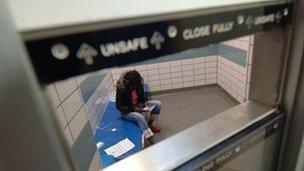Court custody suites criticised by prisons watchdog
- Published

HMIP said some detainees were not always kept "appropriately separate"
Women and children awaiting trial are being kept too close to men in court custody suites, a watchdog has found.
HM Inspectorate of Prisons (HMIP) said there was "widespread confusion" about separation of men, women and juveniles.
HMIP said pregnant women had to sit on hard benches for several hours in some courts, meanwhile disability and faith provision was also criticised.
Chief Inspector of Prisons Nick Hardwick said "much can be done" in the short term to improve the situation.
The HMIP study covered four crown courts and 12 magistrates' courts in Cleveland, Durham and Northumbria.
The report came in a new round of inspections of court custody operations, which are contracted out.
HMIP said some detainees were not always kept "appropriately separate".
Court managers were "insufficiently engaged" with custody suites but there were good working relationships between court staff and the contractor, HMIP added.
The report found staff were generally not clear about when to close the partition in custody transfer vehicles, designed to separate men and women or adults and children.
Staff had tried to provide reading materials by bringing in newspapers, and all courts had sandwiches and microwave meals available.
However, at North Tyneside court some of the meals were out of date.
Most courts did not have enough extra clothing or blankets during cold weather, the report found.
Cell conditions were "deplorable" at Newcastle magistrates' court, and "poor" at Newton Aycliffe, Teesside magistrates', Newcastle crown court and Sunderland.
But HMIP found there was little use of force and mental health services were good.
Mr Hardwick said: "Improvements to buildings will require capital spends, but there is much that can be done to improve matters in the short term, especially if court managers focus on the custody suites as an integral part of their role in running the courts."
- Published29 October 2012
- Published25 September 2012